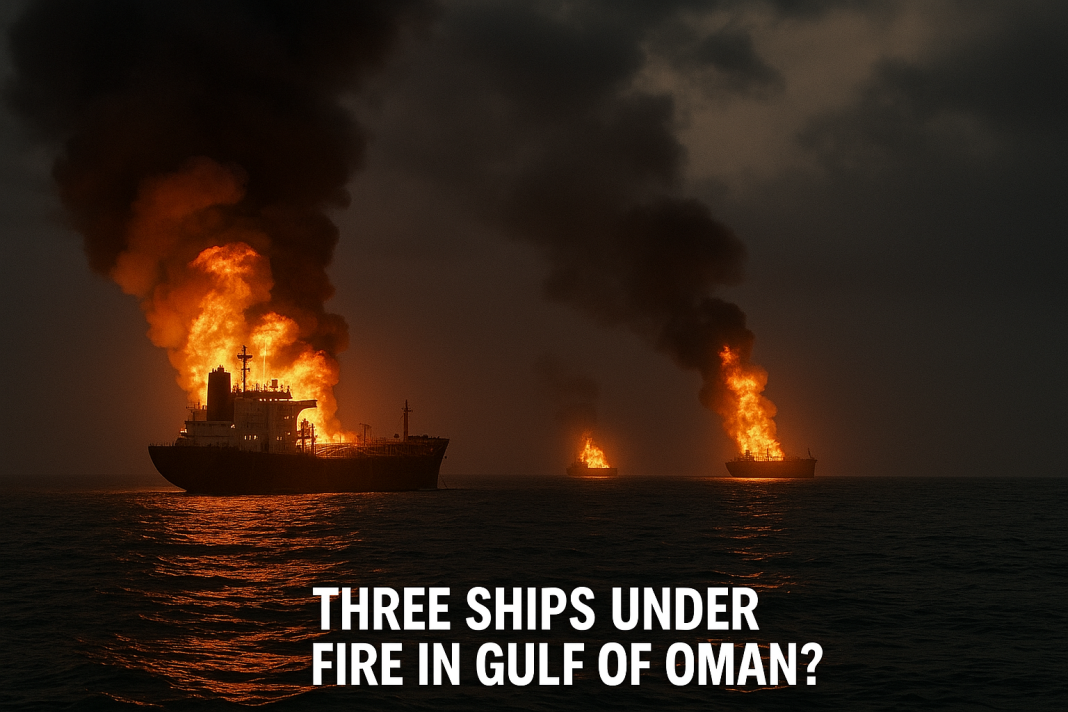Three mysterious heat signatures have triggered panic in one of the world’s most critical oil trade routes – Gulf of Oman. Photos claiming to show ships on fire near the Strait of Hormuz have gone viral, just as the war between Israel and Iran reaches a dangerous new phase.
The satellite heat maps, reportedly from NASA’s FIRMS system, reveal blazing hotspots in the Gulf of Oman—but no official confirmation of burning ships has come in yet. This murky maritime incident unfolds against the backdrop of missile strikes, nuclear threats, and rising fears of a full-blown Middle East oil crisis.
🚢 Three Ships on Fire? Unverified Photos Raise Global Alarm
Photos surfacing across social media Monday showed what appeared to be three commercial vessels engulfed in flamesoff the Iranian coast. Users quickly pointed to NASA’s Fire Information for Resource Management System (FIRMS), where three red heat spots could be seen glowing in the Gulf waters.
A British maritime security firm confirmed an “incident” near Khor Fakkan, just 22 nautical miles from the Strait of Hormuz—but no one can say for sure if these heat spots indicate ships ablaze or something else entirely.
“Photos are circulating showing ships on fire. NASA FIRMS also shows three heat signatures in the area,” one user posted, intensifying speculation.
Despite this, no maritime authority has verified the damage, nor have any ship operators issued distress signals. But the timing couldn’t be worse.
⚠️ Strait of Hormuz Under Digital Siege: Ships Losing Navigation in Real Time
While eyes focused on the possible ship fires, a bigger threat quietly emerged: massive electronic interference affecting ship navigation systems.
According to the Joint Maritime Information Centre (JMIC)—a U.S.-led global naval watchdog—ships in and around the Strait are now losing control of their automated location systems (AIS). These disruptions are reportedly emanating from near Iran’s Port of Bandar Abbas, threatening collision risks, route confusion, and maritime chaos.
“The disruptions are intense and growing. Ships can’t accurately send their positions,” warned a JMIC official.
The UK’s maritime agency echoed the alert, noting a sharp rise in GPS jamming and electronic spoofing throughout the Gulf. Greece, which manages one of the largest tanker fleets on the planet, has already asked its ships to log every movement when entering the Hormuz region.
💥 Israel-Iran War Spills Into Sea: Oil Lifeline Under Threat
As fire and interference grip the Gulf of Oman, the Israel-Iran conflict is exploding with dangerous speed. On Monday, Iran fired missiles at Israeli cities, and Israel responded with targeted attacks on Iranian nuclear and missile infrastructure. More than two dozen people are dead, with hundreds injured across both nations.
Israel has been striking nuclear enrichment sites and defense factories since Friday, determined to stop Iran from enriching uranium to weapons-grade levels. Iran, in return, is firing ballistic missiles, escalating what may become the region’s most volatile war in decades.
Now, the Strait of Hormuz—already vulnerable to closure threats from Tehran—is once again in the spotlight.
“If Iran shuts down Hormuz, global oil could skyrocket,” a trade analyst said.
Nearly 20% of the world’s oil passes through this narrow waterway. Even a minor disruption can cause global economic tremors.
⛔ What Happens If Hormuz Is Closed?
-
Global oil supply may be cut off or delayed.
-
Fuel prices could surge within hours.
-
Shipping insurance costs may rise sharply.
-
Military tension in the region may spiral into open war.
Iran has threatened to block the Strait before. With current tensions, that threat is more believable than ever.
🧭 Digital War, Physical Fire: A Dangerous Mix
This is not just a military conflict—it’s turning into a tech-driven maritime battlefield. Ships are now navigating blindin one of the world’s busiest oil lanes, while missiles fly and photos of burning vessels spread like wildfire.
Even if no ships are currently on fire, the combination of uncertainty, digital sabotage, and open warfare is enough to shake global trade confidence.
🚨 The World Watches in Silence
As the Gulf of Oman smolders in fear, global powers have remained largely silent. The threat to global oil, shipping safety, and digital maritime infrastructure grows with every passing hour.
One anonymous maritime official summed it up best:
“We don’t need a bomb to stop trade—right now, confusion is just as effective.”
